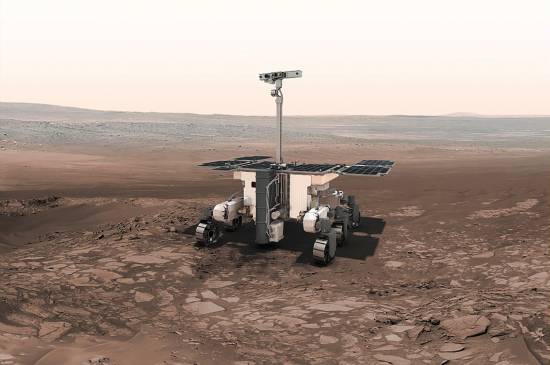Russia's invasion of Ukraine has delayed Europe's plan to search for signs of life on Mars, with the European Space Agency announcing Thursday that it will no longer be attempting to send its first rover to the red planet this year.
If cooperation on the mission cannot be resumed with Roscosmos, Russia’s state space corporation, then it's likely to be 2026 or 2028 before the ExoMars rover is blasted off toward Mars, the agency added.
Previous plans to launch the probe with Russia this September are now “practically impossible but also politically impossible," said the agency's director, Dr. Josef Aschbacher.
“This year, the launch is gone."
The agency had previously said that the mission was “very unlikely" because of Russia's war against Ukraine. The decision to suspend cooperation with Roscosmos was taken by ESA’s ruling council, at a meeting this week in Paris.
“We deeply deplore the human casualties and tragic consequences of the aggression towards Ukraine,” an ESA statement said. “While recognizing the impact on scientific exploration of space, ESA is fully aligned with the sanctions imposed on Russia by its member states.”
Because of their respective orbits around the sun, Mars is only readily reachable from Earth every two years. The earliest next launch window would be 2024. But if sanctions on Russia haven't been lifted by then, enabling cooperation with Roscosmos to resume, then that window could be missed, too.
Unpicking Russia's imprints on the rover mission and replacing Russian components with parts from elsewhere will take time. The rover itself, named Rosalind Franklin and equipped with a drill, is European but has some Russian components.
Its landing platform, Kazachok, is Russian, but has some European instruments, too.
The rover is intended to be the first to search for signs of life at depths up to 2 meters (6 feet) below the Martian surface, where they could be well preserved, if they exist.
The ExoMars mission has already been pushed back from 2020, because of the coronavirus pandemic and the need for more tests on the spacecraft.
The mission was to have blasted off on a Russian Proton-M rocket from the Baikonur launch site in Kazakhstan in September, and had been scheduled to land on the red planet some nine months later.
Already on Mars are NASA’s Perseverance rover, which landed in February 2021, and China’s first Mars rover, Zhurong, named after the Chinese god of fire./AP


